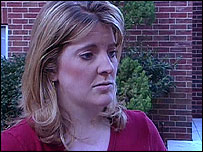Mindy Tucker Fletcher
Mindy Tucker Fletcher joined the California state administration as Governor Arnold Schwarzenegger's deputy chief of staff in May 2005. Identifying her main concern as "constituent outreach," Tucker Fletcher said her position "is really an extension of the governor and his relationship with a lot of groups outside state government and outside the state Legislature." [1]
Previous to joining the Schwarzenegger administration, Tucker Fletcher was Senior Vice President of Public Affairs with Ogilvy PR's Sacramento, California office, from January 2004 to May 2005.
Contents
Republican Party Positions
Tucker Fletcher has a long history of activism with the Republican Party, including: [2]
- Being a "counselor" to the California Republican Party;
- Advising the Bush-Cheney '04 campaign, "on issues related to California and assisted the state Republican Party with communications and coalition strategy, including coordinating and strengthening the women's coalition within the party apparatus," including as "co-chair of the National Steering Committee of W Stands for Women" [3];
- Serving as Communications Director of the Republican National Committee in 2002 - 2003;
- Serving as Director of Public Affairs for the U.S. Department of Justice, "where she managed communications efforts on many high-profile issues, including the September 11 attacks";
- Serving as National Press Secretary of the "Bush for President" campaign in 2000;
- Serving as Senior Spokesperson during the Florida recount effort;
- Working for then-Governor George W. Bush's successful 1998 reelection campaign in Texas;
- Working in the Washington office of Rep. Sam Johnson (R-TX), for five years.
2004 Presidential Campaign
In October 2004, PR Week reported that Fletcher "has been brought back to Florida by Victory 2004, a joint operation between the Republican National Committee and Bush-Cheney 2004." Regarding the Kerry campaign's recruiting of some 10,000 lawyers to monitor the November 2, 2004 election in swing states [4], Fletcher remarked, "We knew Florida [would] be an issue, then [the suits] started becoming an issue in 10 states or so. The Democrats just don't like the laws, and they want to overturn them." She also told PR Week that "she and a team of GOP strategists are training spokespeople in swing states to answer questions regarding voter fraud, military ballots, and racial bias."[5]
On October 26, 2004, BBC News reported on a "document obtained from inside Bush campaign headquarters in Florida suggest[ing] a plan - possibly in violation of U.S. law - to disrupt voting in the state's African-American voting districts" by systematically challenging large numbers of black, Democratic-leaning voters in Jacksonville. In response, Fletcher "stated the list was not put together 'in order to create' a challenge list, but refused to say it would not be used in that manner. Rather, she did acknowledge that the party's poll workers will be instructed to challenge voters, 'Where it's stated in the law.'"[6]
Following a labor union action protesting Bush administration overtime policies in October 2004 where protesters "stormed into pro-Bush campaign offices in Miami, Orlando and Tampa ... chanting slogans and shoving a few staffers," Fletcher decried the "atmosphere of 'hate' created by the Kerry campaign." She said, "I think the other side is a Democratic party filled with hate right now. ... This just shows the lengths they will go to to try to harass and intimidate Republicans and people who support President Bush. When you have a presidential candidate who calls the president a liar and his supporters idiots, that's what you end up with on the ground."[7]
Pro-Business Efforts
In early 2004, Fletcher was active on behalf of California businesses campaigning for or against state ballot measures that would come before voters in November. The Sacramento Bee reported that she "is preparing to organize a coordinated business response to the November ballot measures." Fletcher told the Bee, "The challenge is the number of issues that could be on the ballot that would affect job creation in the state. And businesses are already involved, so for me it's more a matter of involving them from a strategic perspective."[8]
SourceWatch Resources
External links
- Jim Evans, "Business to spend big for fall ballot," Sacramento Bee, February 7, 2004.
- Oscar Corral, "Union protesters swarm Bush campaign offices," The Miami Herald, October 6, 2004.
- Douglas Quenqua, "Republicans augment PR as election lawsuits generate coverage," PR Week (reg. req'd.), October 25, 2004.
- Greg Palast, "New Florida vote scandal feared," BBC, October 26, 2004.
- Gary Delsohn, "Bush aide joins governor," Sacramento Bee, May 27, 2005.
